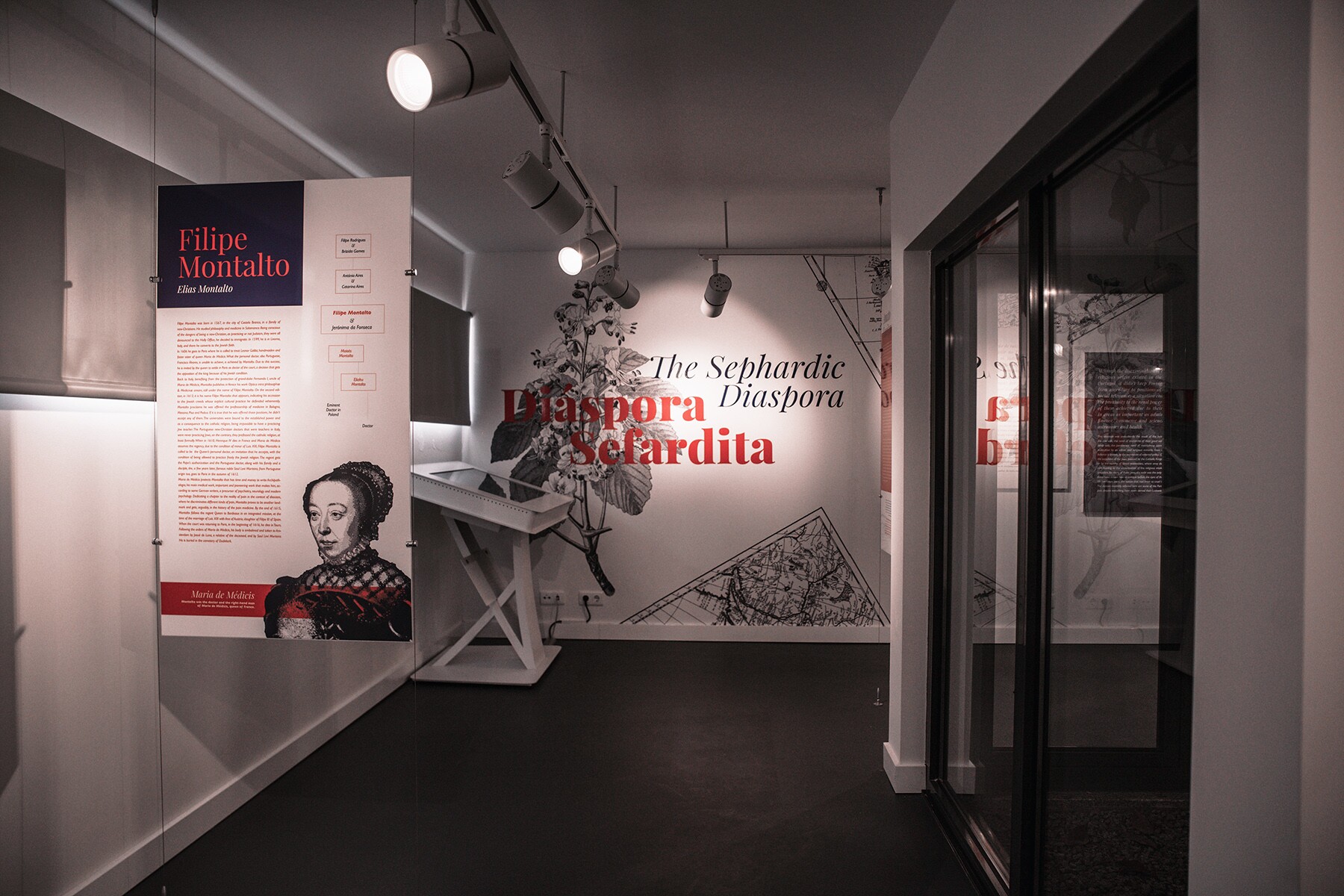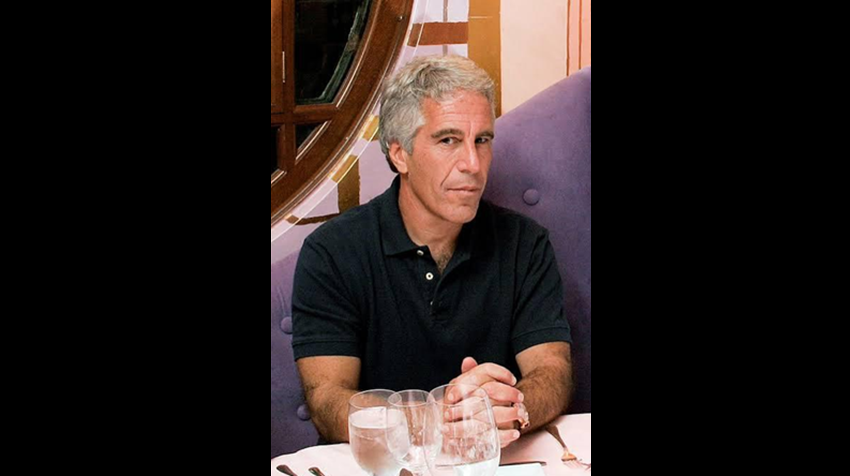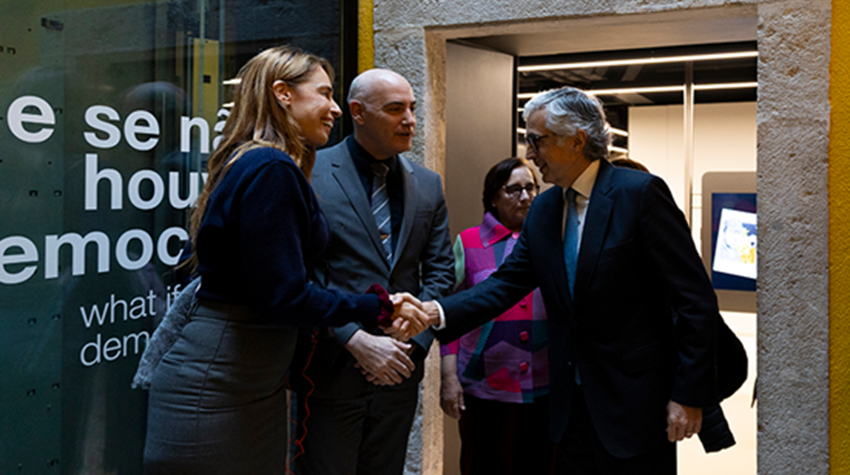The House of Memory of Sephardic Medicine – Ribeiro Sanches, inaugurated in December 2021, is part of the Network of Jewish Quarters of Portugal, an organization in which the Municipality of Penamacor was a founding member. The building serves as a space of remembrance, honoring individuals connected to the practice of iatric activities carried out by physicians, surgeons, and apothecaries of Sephardic origin or descent, as well as other renowned "Portuguese Jewish doctors left with no choice but exile."
Structured into four zones, visitors can explore the space while gaining an introduction to the Network of Jewish Quarters, walking through the Corridor of All Names, which features a mural displaying approximately five hundred names drawn from the inquisitorial processes of the Holy Office—specifically from the tribunals of Lisbon, Coimbra, and Évora. They can also wander through the room dedicated to the Diaspora, which highlights the most distinguished doctors from the 16th to the 18th century, showcasing prominent figures such as Garcia de Orta, Amato Lusitano, and Rodrigo de Castro.
The final area, located on the upper floor, is entirely dedicated to the illustrious Penamacor-born physician António Nunes Ribeiro Sanches, who came from a family of New Christians and was himself a child of the Diaspora. In this room, visitors can delve into Ribeiro Sanches' life and work, his network of connections with other distinguished intellectuals of the 18th century, and his journey across Europe, which took him to the Russian court and eventually to Paris, at the heart of the Enlightenment, where he passed away in 1783.
António Nunes Ribeiro Sanches (Penamacor, March 7, 1699 – Paris, October 14, 1783) was a Portuguese physician and polymath who also distinguished himself as a philosopher, pedagogue, and historian. He authored dozens of manuscripts under the influence of Enlightenment pedagogy, although only nine were published during his lifetime, with most of his works remaining in archives.
In medicine, Ribeiro Sanches excelled in venereology, earning him the title "the doctor of the evils of love." He contributed to Diderot and d’Alembert’s Encyclopedia at their request. His name is prominently featured among the leading thinkers of European Enlightenment. The Marquis of Pombal, as Secretary of State, utilized much of Ribeiro Sanches’ knowledge to advance cultural and scientific reforms aimed at modernizing Portugal.
Biographical Background
Ribeiro Sanches was born into a wealthy New Christian family of traders from Beira Baixa. His father, Simão Nunes Flamengo, hailed from Penamacor, while his mother, Ana Nunes Ribeiro, was from Idanha-a-Nova. He had three siblings: Diogo, Isabel, and Maria. Ribeiro Sanches was a descendant of the renowned physician Francisco Sanches (1551–1623).
Encouraged by an uncle who was a legal scholar, Ribeiro Sanches began studying law at the Faculty of Law at the University of Coimbra in 1716. Though physically frail, he was intellectually vigorous and an avid reader, drawing early inspiration from Hippocrates' Aphorisms. Dissatisfied with his legal studies, he transferred to the Faculty of Medicine at the University of Salamanca, where he earned his Doctor of Medicine degree in 1724.
Despite his New Christian status, Ribeiro Sanches secretly adhered to Judaism, fearing the Inquisition. Reflecting on this, he remarked: "When I was born, the bonfire of the Holy Inquisition was already burning bodies and souls in the Rossio of Lisbon and Évora, as well as in the Paços of Coimbra and Goa."
After practicing medicine in Benavente, Guarda, and Amarante, Ribeiro Sanches was denounced by a cousin to the Inquisition for practicing Judaism. He managed to evade capture and lived the remainder of his life in exile.
Professional Journey
Ribeiro Sanches spent time in Genoa, Montpellier, Bordeaux, and London, where he practiced medicine. He eventually settled in Leiden, Netherlands, to study under Hermann Boerhaave (1668–1738), one of the foremost medical professors of the era. Boerhaave’s recommendation helped Ribeiro Sanches secure a position in Russia in 1731, where he served as a military doctor with great success.
Appointed as the clinician of the Imperial Cadet Corps in Saint Petersburg, his reputation led to his appointment as physician to Tsarina Anna Ivanovna. In 1739, he was inducted into both the Saint Petersburg Academy of Sciences and the Paris Academy of Sciences.
After over 15 years in Russia, where he rose to the rank of State Councilor, Ribeiro Sanches left in 1747 for Paris, escaping the intrigues of the tsarist court. In Paris, he received a grant from Catherine the Great of Russia and was welcomed by Frederick the Great of Prussia. He spent the rest of his life in the "City of Lights," collaborating with the leading intellectuals of the Enlightenment, practicing medicine, and dedicating himself to study and writing.
Legacy
Throughout his life, Ribeiro Sanches maintained extensive correspondence with prominent European intellectuals and fostered strong connections with major cultural institutions. He was a correspondent for the International Academy of Paris, a member of the Royal Society of London, and a member of the Saint Petersburg Academy of Sciences.
Empress Catherine the Great honored him with a coat of arms bearing the motto: "He believed he was born to be useful, not to himself, but to the whole world."
Credit: CM Penamacor


































